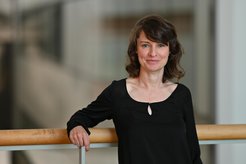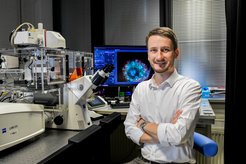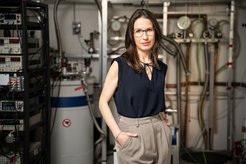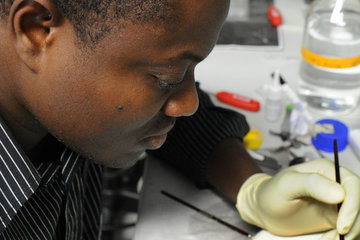Three new Dioscuri leaders in the Czech Republic
Two physicists and a developmental biologist will head the three new Dioscuri Centres in the Czech Republic.
Their appointment marks the start of the Dioscuri Programme in another Central European country, after Poland, where it is contributing to the strengthening of scientific excellence.

Barbora Špačková, Dioscuri Center for Single-Molecule Optics

Life's most vital processes take place on the nanometer scale, a billion times smaller than the size of a human body, where molecules orchestrate its complex functions. Yet, current microscopy tools face limitations in peering into this realm, which leaves us with a myriad of unanswered questions related to the fundamental understanding of molecular processes pervading life. The Dioscuri Centre for Single-Molecule Optics will open in summer 2024 and focus on developing a unique life-science toolbox based on the principles of nanooptics and nanofluidics. This innovation will allow us to dive into a biological nano-universe and study it in ways that were not possible until today – in its natural state, in real time, and at the level of single molecules. The research will provide a rich pool of information that is currently lacking, catalyze new strategies for early diagnosis and therapeutic intervention, as well as inspire the invention of new biotechnologies mimicking nature.
As a physicist, Barbora Špačková specializes in the interaction of light and matter at the nanoscale and has held keen interest in the realm of life science. Her goal: to harness the principles of nanoscale physics to develop cutting-edge instruments that will transform our understanding of life's fundamental components. "Throughout history, scientific breakthroughs have been propelled by the creation of innovative tools and techniques, and I am committed to contributing to this tradition in the field of bio-technology," Špačková said. The Dioscuri Programme provided her with the perfect opportunity “to capitalize on the expertise and experiences I gained abroad and channel it back into my homeland. With its generous funding it supports ambitions projects and provides wide creative freedom, enabling me to pursue innovative avenues in research."
Špačková joined the Institute of Physics of the Czech Academy of Sciences (FZU, Prague) in 2022 after five years at Swedisch research institutions (Chalmers University and the University of Gothenburg), mainly on account of its interdisciplinary research environment and state-of-the-art infrastructure. “The Department of Optical and Biophysical Systems at FZU offers a fertile platform for the emergence of new concepts at the crossroads of different research fields - thus it makes the perfect host for my new Dioscuri Centre.”
Peter Fabian, Dioscuri Centre for Stem Cell Biology and Metabolic Diseases

In his new Dioscuri Centre, Peter Fabian and his team aim to unravel the mysteries of inherited human diseases using animal models. They are particularly interested in understanding how metabolic pathways can affect our growth, thinking abilities, and overall social well-being. More specifically, studying disorders related to amino acids, such as Phenylketonuria, Tyrosinemia I-III, and Alkaptonuria, and introducing the genetic mutations found in humans into animal models. This will allow the team to dig deep into the mechanisms and origins of these diseases with the ultimate goal to pioneer new treatments and medications in order to enhance the quality of life for patients and supporting healthcare professionals.
Fabian uses zebrafish for his research, a model organism that shares about 70 percent of its genes with humans. "Since my PhD studies, I have been passionate about creating an animal model that can uncover the mysteries of human biology and mimic human conditions. Ultimately, I hope my research can help patients with congenital diseases," says the newly selected Dioscuri Centre leader. After his five-year postdoctoral stay in the U.S. (University of Southern California, USC), he decided to return to Central Europe with his family and joined the Masaryk University in Brno, where he found optimal conditions for starting his independent research career. Next to the Dioscuri Centre, Fabian was also awarded one of three ERC Starting Grants going to the Czech Republic this year. With the funding from both of these prestigious grants, Fabian is looking forward to growing his research group in Brno and "to starting this new chapter in my career and contributing to the scientific community in the Czech Republic and beyond."
Helena Reichlová, Dioscuri Centre for Spin Caloritronics and Magnonics

The third researcher selected as Dioscuri Centre leader is solid-state physicist Helena Reichlová. Her research program aims to open up new research directions and investigate spin caloritronics and magnonics in altermagnets. By focusing on these breakthrough materials, Reichlova hopes to achieve results that have implications for other scientific and technological fields such as spintronics, field-effect electronics, superconductivity and neuromorphic information technology. Her Dioscuri Centre is also being established at the Institute of Physics of the Czech Academy of Sciences, more specifically in the Department of Spintronics and Nano-electronics starting on October 1st, 2023.
Read more here: Helena Reichlova leads first Dioscuri Centre in the Czech Republic
Up to five Dioscuri Centres are to be established in the Czech Republic in total, a second call will follow in fall 2024. International applicants from all scientific disciplines are invited to apply for their own research group at a Czech host institution. Each Centre is funded with 1.5 million Euros for 5 (plus possibly 5 more) years, provided in equal parts by the German Federal Ministry of Education and Research and the Czech Ministry of Education, Youth and Sports.















